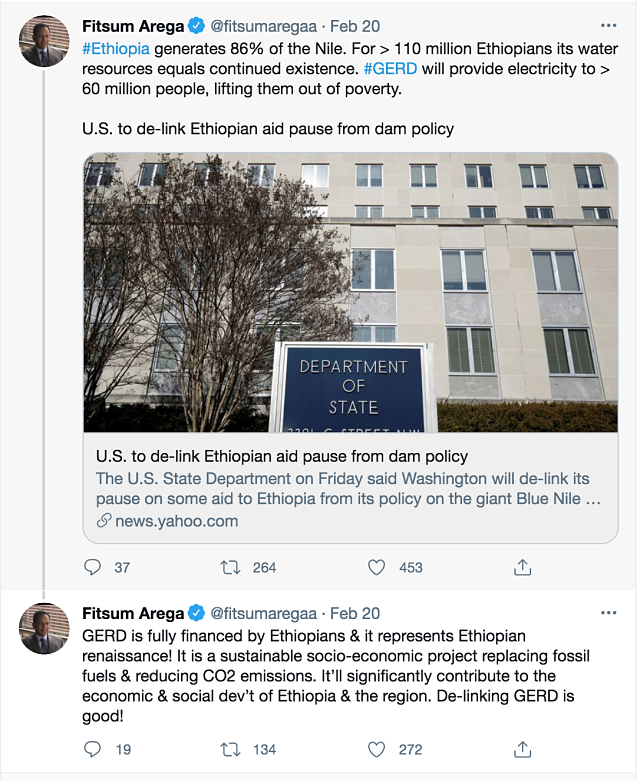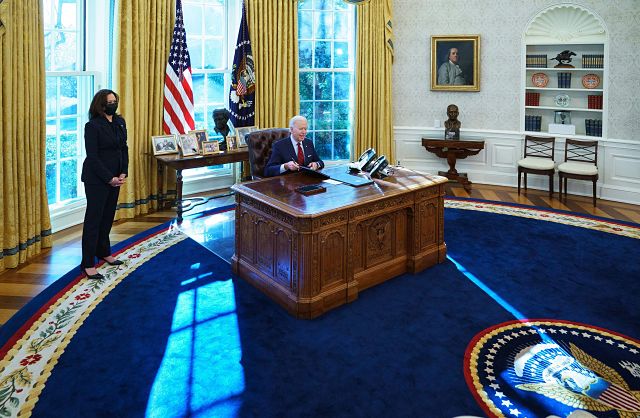 Getty Images
Getty Images
Reuters
Biden Discusses Crisis in Ethiopia’s Tigray Region With Kenyan Leader -White House
WASHINGTON (Reuters) – U.S. President Joe Biden, in a call with Kenyan President Uhuru Kenyatta on Thursday, discussed the crisis in Ethiopia’s Tigray region, the White House said.
Biden and Kenyatta “discussed the deteriorating humanitarian and human rights crises in Ethiopia’s Tigray region and the need to prevent further loss of life and ensure humanitarian access,” the White House said in a statement.
The United States has expressed concern over the crisis in Tigray, where the Ethiopian government has claimed victory over a rebellious regional government in a conflict that began in November.
—
Related:
VOA News: US Restoration of Foreign Aid to Ethiopia Signals New Course
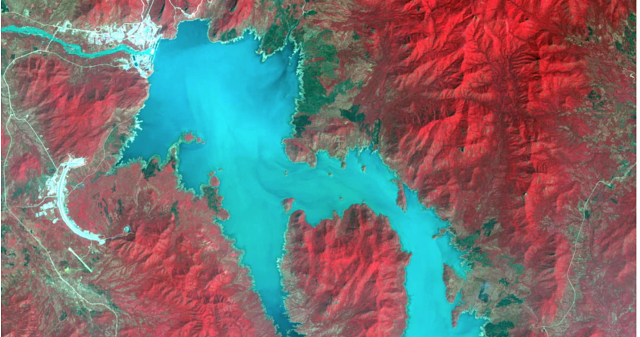
Ethiopian Ambassador to the U.S. Fitsum Arega celebrated the move, saying the GERD has the potential to provide electricity to 60 million people and lift them out of poverty. (Photo via Reuters)
Voice of America
By Salem Solomon
WASHINGTON – The Biden administration’s reversal of policy that foreign aid to Ethiopia will not be linked to its Grand Ethiopian Renaissance Dam (GERD) hydropower project signals a decided change in U.S. relations with Ethiopia, analysts say.
“It is a fairly predictable move, as the Trump administration aid freeze had not achieved anything other than further antagonizing the Ethiopians,” William Davison, International Crisis Group’s senior analyst for Ethiopia told VOA.
Former President Donald Trump cut $100 million in aid to Ethiopia in September 2020 saying it would be withheld until the country agreed to a deal following a mediation effort led by U.S. Treasury Department and the World Bank.
The relationship further deteriorated when Trump said Egypt would “end up blowing up the dam” during a conference call. This resulted in Ethiopia’s foreign minister summoning the U.S. ambassador in Addis Ababa and calling the comments an “incitement of war” between Ethiopia and Egypt.
U.S. State Department spokesman Ned Price said the total amount of aid to Ethiopia affected by the pause was $270 million. He told reporters last week that the U.S. is reviewing the paused aid money to ensure it goes where it is needed most.
“We are committed to providing life-saving assistance to those in need, and humanitarian assistance does remain exempt from the pause,” Price said.
Price added that the U.S. will try to play a constructive role in ongoing discussions between Ethiopia, Sudan and Egypt over Nile River water usage issues.
“We understand the GERD is a major issue for the three parties,” he said. “We’re reviewing our GERD policy and assessing the role that we can play in facilitating a solution between those parties.”
Ethiopian Ambassador to the U.S. Fitsum Arega celebrated the move, saying the GERD has the potential to provide electricity to 60 million people and lift them out of poverty.
“GERD is fully financed by Ethiopians & it represents the Ethiopian renaissance!” Fitsum wrote in a tweet. “It is a sustainable socio-economic project replacing fossil fuels & reducing CO2 emissions. It’ll significantly contribute to the economic & social dev’t of Ethiopia & the region. De-linking GERD is good!”
Negotiations between the three Nile River countries hit an impasse over how quickly Ethiopia would fill the dam’s reservoir and what mechanisms would be put in place to stop the filling in the event of drought or water level drops.
“It’s certainly a stop-start process, and I think one of the dynamics that recurs is that the parties come together, and they stitch together something, which is more of a kind of political agreement than it is any sort of technical or legal agreement,” analyst Davison said. “And of course, when you have a political agreement that opens up whatever text they’ve agreed on four different interpretations.”
Egypt relies on the Nile for roughly 90 percent of its fresh water and is concerned that the dam and its reservoir, with a capacity of 74 billion cubic meters, will diminish its water supply. Egypt has warned that it could lose about 22 percent of its water flow making thousands of acres of farmland unusable.
In July, as negotiations were ongoing, Ethiopia began filling the dam leading to angry denunciations from Egyptian leaders.
Ethiopia has said it will fill the dam over four to seven years.
Mirette Mabrouk, director of the Egypt program at the Middle East Institute, said there is a disagreement between the parties over whether Ethiopia has the right to unilaterally begin filling the dam.
“The very, very least one would expect that the negotiations would be over before Ethiopia started filling unilaterally,” she said. “Ethiopia has always said it has always maintained that it does not need the agreement of Egypt and Sudan to start filling. That’s directly contradicted by Egypt and Sudan, who say that the 2015 Declaration of Principles agreement signed by Egypt, Ethiopia and Sudan specifically says that shouldn’t have unilateral action on the filling.”
Mabrouk said tensions remain high between the countries, but she does not think a military confrontation is inevitable.
“Nobody wants that kind of conflict,” she said. “But I do think that if Egypt and Sudan have their backs up against the wall, it may be a final option. But Egypt understands very, very well that any military option is really not going to be in anyone’s favor.”
—
Related:
UPDATE: US to Unlink Trump Era Aid Cut to Ethiopia From GERD, Plans Special Envoy for Horn of Africa
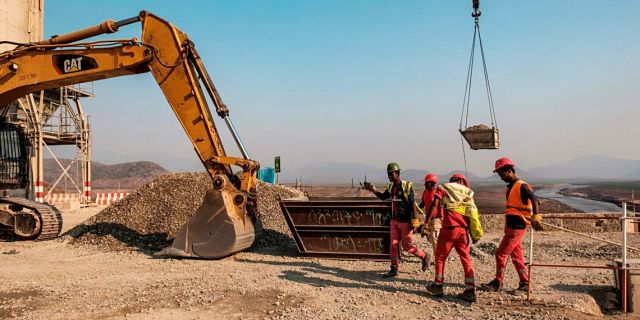
Ethiopians were furious after former President Donald Trump last year directed the suspension of aid to their country in a rare example of his direct involvement in an African issue. Ethiopia had left a U.S.-led attempt to mediate the dispute with Egypt, alleging bias. Trump also caused an uproar by saying downstream Egypt would “blow up” the dam project that Cairo considers an existential threat. – AP (Getty Images)
Reuters
Updated: February 18th, 2021
US to Unlink Paused Ethiopian Aid from Dam Policy
WASHINGTON – The U.S. State Department on Friday said Washington will unlink its pause on some aid to Ethiopia from its policy on the giant Blue Nile hydropower dam that sparked a long-running dispute between Egypt, Ethiopia and Sudan.
U.S. State Department spokesman Ned Price told reporters that President Joe Biden’s administration will review U.S. policy on the Grand Ethiopian Renaissance Dam (GERD) and will assess the role the administration can play in facilitating a solution between the countries.
Filling started in July
A bitter dispute between Egypt, Ethiopia and Sudan over the filling and operation of the dam remains unresolved even after the reservoir behind the dam began filling in July.
“We continue to support collaborative and constructive efforts by Ethiopia, Egypt and Sudan to reach an agreement on the GERD,” Price said.
The temporary pause on certain U.S. foreign assistance to Ethiopia affects $272 million in development and security assistance to Ethiopia, Price said, adding that the resumption of assistance will be assessed on a number of factors and that the decision has been shared with Addis Ababa.
Among the factors assessed will be “whether each paused program remains appropriate and timely in light of developments in Ethiopia that occurred subsequent to the pause being put in place,” a State Department spokesperson said.
Trouble in Tigray region
The United States has expressed concern over the humanitarian crisis in the Tigray region of Ethiopia, where the central government has claimed victory over a rebellious regional government in a conflict that began in November.
Ethiopia began filling the reservoir behind the dam after the summer rains last year despite demands from Egypt and Sudan that it should first reach a binding agreement on the dam’s operation.
Egypt views the dam as a major threat to its fresh water supplies, more than 90% of which come from the Nile. The Blue Nile flows north into Sudan then Egypt and is the Nile’s main tributary.
Aid cut to Ethiopia
Ethiopia says the dam is crucial to its economic development.
Then-U.S. President Donald Trump said Ethiopia had broken a U.S.-brokered agreement to resolve the dispute, forcing him to cut funds. The United States cut $100 million in aid to Ethiopia in September.
Ethiopia in October summoned the U.S. ambassador over what it called an “incitement of war” between Ethiopia and Egypt from Trump over their dispute.
—
Related:
US: Aid pause to Ethiopia no longer linked to dam dispute (AP)
Biden Mulls Special Envoy for Horn of Africa (FP)
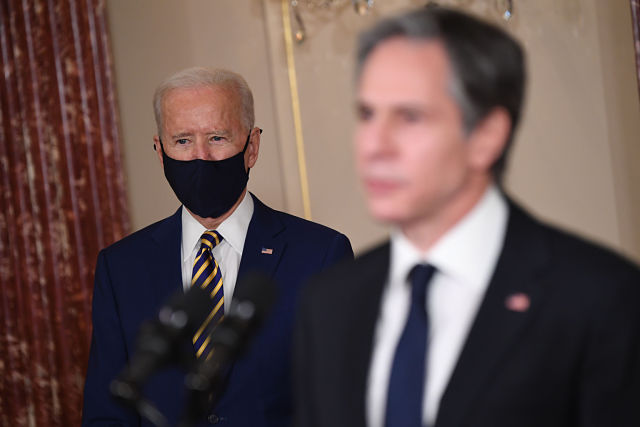
The post, if created, would bring more diplomatic firepower to the brewing crisis in Ethiopia as members of Biden’s cabinet and other senior State Department nominees await confirmation. (Photo: U.S. Secretary of State Antony Blinken speaks to staff during the first visit of President Joe Biden to the State Department in Washington on Feb. 4./ GETTY IMAGES)
Foreign Policy Magazine
Updated: February 17th,2021
This article is part of Foreign Policy’s ongoing coverage of U.S. President Joe Biden’s first 100 days in office, detailing key administration policies as they get drafted—and the people who will put them into practice.
The Biden administration is weighing plans to establish a new special envoy for the Horn of Africa to address political instability and conflict in the East African region, including a brewing civil war and humanitarian crisis in northern Ethiopia, current and former officials familiar with the matter told Foreign Policy.
The new special envoy post could fill a diplomatic leadership gap in the administration’s foreign-policy ranks as it works to install other senior officials in the State Department, a process that could take weeks or even months to complete, as they require presidential nomination and Senate confirmation. Special envoy posts do not require Senate confirmation.
A new Horn of Africa envoy would have their work cut out for them: Sudan is undergoing a delicate political transition after three decades under a dictatorship, South Sudan is wracked by chronic instability and corruption, and the fragile government of Somalia is grappling with ongoing threats from the al-Shabab terrorist group and political gridlock that has delayed national elections. An ongoing dispute between Ethiopia, Egypt, and Sudan over a major dam project adds another layer of complexity to the tensions in the region.
The most pressing crisis in the eyes of many U.S. policymakers, however, is in Ethiopia. In November 2020, Prime Minister Abiy Ahmed launched a military campaign against the ruling party in the country’s northern Tigray region, after accusing it of attacking a government military base. Conflict has ravaged the region since then, marked by thousands of deaths, millions in need of humanitarian assistance, and widespread reports of interethnic violence. U.S. officials fear that the conflict could turn into a full-blown regional crisis, with turmoil spilling over into neighboring Eritrea and Sudan.
While officials cautioned no final decision has yet been made, one top contender for the potential job is Donald Booth, a seasoned diplomatic troubleshooter in the region who currently serves as U.S. special envoy for Sudan and has previously served as U.S. ambassador to Liberia, Zambia, and Ethiopia.
Some experts welcomed more attention to the Horn of Africa but cautioned against the new administration relying too heavily on special envoy posts. “I don’t want us to get back into the practice of throwing special envoys at every problem set. It often saps the State Department’s resources and authorities in ways that aren’t productive,” said Judd Devermont, director of the Africa Program at the Center for Strategic and International Studies, a think tank, and a former senior U.S. intelligence analyst. “But in this case, it is urgent, and there aren’t enough senior people in the region.”
With less than a month in office, President Joe Biden doesn’t yet have his full cabinet in place, let alone many senior posts across the State Department that require Senate confirmation. Biden has yet to name a nominee for the assistant secretary of state for African affairs, and the U.S. ambassador posts in Eritrea and Sudan are unfilled, held in an acting capacity by lower-ranking diplomats. The next U.S. ambassador to Ethiopia, Geeta Pasi, is expected to arrive at her post shortly.
A State Department spokesperson did not confirm the administration was set on creating the new special envoy post when asked for comment. “Africa is a priority for the Biden-Harris administration, and we are committed to re-invigorating our relationships throughout Africa from a position of mutual respect and partnership. This includes deepening our engagement on the challenging issues present in the Horn of Africa,” the spokesperson said. “Senior-level engagement on a consistent basis will be a signal of our commitment. The Administration is actively considering a range of options to ensure that our staffing, including any use of Special Envoys, supports implementation of our strategy.”
One big question would be whether the new special envoy post would report directly to the president or secretary of state, or to the assistant secretary of state for African affairs. The former would be viewed as more empowered to negotiate on behalf of Washington, with a direct line to the president or his cabinet.
Some administration insiders have also floated the idea of tapping a former senior U.S. lawmaker for the job, arguing someone with political clout could engage directly with senior African leaders, including Ethiopia’s Abiy. (Biden has eyed former Republican Arizona Sen. Jeff Flake for a senior diplomatic post, such as an ambassadorship in South Africa or Europe, according to Axios.)
—
Join the conversation on Twitter and Facebook.





